Comparing cost of ownership: EVs vs ICE cars
What I found may be of interest to you.
This article is a little different from my typical topic. I wanted to share some interesting information that I learned.
Last fall my wife and I decided to do a little bit of car shopping. We do not need to buy a car immediately, but since we both own fairly old cars, we wanted to do some preliminary research so that we were prepared if one of them suddenly went kaput.
For reference, I own a 2002 Subaru WRX wagon, while my wife owns a 2015 Nissan Leaf. My car is powered by an internal combustion engine (with TURBO, baby!), while my wife’s car is an electric vehicle.
I had a few criteria for our new car. I wanted a car with a large enough cargo area for an extended family camping trip. My Subaru offers barely enough storage with one seat down, so our new car needed to be at least as big on the inside. This realistically meant some type of small SUV (where have all the wagons gone?). We also at least wanted the option of buying AWD. We were undecided as to whether we should buy a:
Standard ICE,
Hybrid or
Plug-in hybrid or
Fully electric vehicle
My wife preferred a fully electric vehicle, while I preferred the plug-in hybrid because my son and I often go on extended camping trips to remote locations with few chargers on the route. I really liked that the plug-in hybrid enables you to go 100% electric for daily use, while still being able to take long road trips away from chargers.
Our criteria were:
Reliability
Cost
Cargo capacity
Mileage/range
All-wheel drive
Style (my wife basically gets a veto on this one! : )
All those factors quickly narrowed down the list. To make a cost-effective purchase, I decided to run a total-cost-of-ownership analysis for the four cars that we were considering:
Tesla Model Y (MSRP: $45,380 for the base model)
Toyota RAV 4 (MSRP: $28,675)
Toyota RAV 4 Hybrid (MSRP: $31,725)
Toyota RAV 4 Prime (a plug-in hybrid with MSRP: $43,690)
All of these cars are roughly comparable. The main difference was the powerplant. Since I like to hold onto cars for long periods of time, I decided to assume 15 years of ownership.
I make no claims that this cost comparison makes sense for you and your needs. First of all, you may not be at all interested in the four cars that I listed above. You may also have completely different buying criteria. Also, the numbers vary by region. In particular, the cost of electricity and gasoline varies greatly by region. Unfortunately, I did not note the websites where I acquired the data, so I will not be able to provide the proper URLs.
High cost of electric vehicles
First I want to point out how expensive most electric cars remain. As someone who has been an electric vehicle enthusiast since the 1990s, this is disappointing.
I believe that the original Nissan Leaf was the first electric car that seems suitable for the masses. Before that model arrived, electric cars were only for enthusiasts who were willing to make significant compromises.
Yes, the Nissan Leaf’s limited range of 81 miles seems pathetic today, but at the time, it was a marvel. And its MSRP of just under $30,000 was very competitive even without federal and state incentives.
Back in September 2015, we ended up paying:
$23,110 for the Nissan Leaf
which was lowered to $15,610 after the federal tax credit!
plus no sales tax (a state incentive)
a 0% 60-month car loan.
I am still amazed at what a good deal we got.
I think we timed it perfectly as September is when the new model year comes out, so dealers are desperate to sell the “older model” even though they are typically identical to the “newer model.” September/October is the best time of year to shop for new cars, plus weeks 9-5 is the best time as sales are slow. In addition to getting a fantastic deal, my wife probably saved about $1000 per year on gasoline. So despite its range limitations, I have no regrets.
At the time, I knew that battery prices were declining and would likely continue doing so for the foreseeable future. I assumed that this would lead to declining MSRP for electric cars over the next decade because batteries are roughly one-third the cost of an electric car.
Boy, was I wrong about that!
Instead, the cost of electric vehicles has gone up. You can expect to pay a premium of $10-12,000 to purchase an electric version of the same model compared to the ICE version. Today, the average price of new EVs in the USA is $58,940 versus $48,008 for ICE cars. And 9 of 10 of the best-selling EVs sell for over 40k. Yes, new Chinese EVs beat that, but it is unclear how many government subsidies are built into that price, so it may not be sustainable.
Almost 10 years later, electric vehicles are still overwhelmingly for above-average-income consumers. Until that changes, electric vehicles will remain a niche transportation method. People talk about range anxiety and the lack of recharging stations, but those factors pale in comparison to the selling price. Quite simply, if EVs sold for the same price as ICE without any subsidies, EVs would make up a huge share of the market.
Anyway, let’s get back to the main point of this article…
First off the list: Plug-in hybrid
As I mentioned earlier, unfortunately I do not have all my initial calculations, but the local dealer said they had no RAV 4 Prime (the plug-in hybrid), but there would be one coming in the future at a massive markup. It would be more than $10,000 more than the RAV 4 Hybrid at the same dealer.
Then I read a Consumer Reports article that compared the reliability of cars based on their powertrain. I had always thought that electric vehicles were considered more reliable (or at least required less maintenance) than ICE cars. I had also heard people tell me that they did not like plug-in hybrids because they double the maintenance. I really did not think that was a big deal, until I read this article.
This graphic from the article is the punch line:
For some people, this may not be a big deal, but remember that reliability was my number 1 criteria. 146% more problems than ICE is a complete dealbreaker for me. And 79% more problems for EVs also made me very nervous. But what also surprised me was that hybrids had 26% fewer problems than ICE vehicles. It is important to note that these numbers include car makers without a great deal of experience designing EVs and plug-in hybrids, so the differences may narrow significantly in the future.
EDIT: After publishing this article, I decided to recheck Consumer Reports to see what they said about the predicted reliability of the RAV4 Prime. Now their data shows that RAV4 Prime is not only more reliable that the RAV4 Hybrid, but it is one of the most reliable cars they tested of any type.
So maybe I was a little too hasty dismissed the Prime.
Second off the list: Standard ICE
In a quick comparison between the standard RAV 4 and the hybrid version told me that the hybrid wins easily. For a mere $3000 extra, you get significantly better gas mileage (39 vs 28 combined mpg). If you drive 12,000 miles per year, you save roughly $450 in gas per year. Just as important, you get a longer range and higher reliability.
I really could not see a reason to choose the standard RAV 4 compared to a hybrid, so it went off the list.
The final standoff:
So here are the final numbers. The entries where the car came out clearly worse are in red text.
The RAV 4 Hybrid clearly wins!
This was honestly a big surprise to me. I live in an area with very inexpensive electricity, so I really thought Tesla would win.
In summary, Tesla dominates in energy cost, but loses in insurance and resale value. It also qualified for the $7500 federal tax rebate. The RAV 4 Hybrid dominates in MSPR. Plus based on Consumer Reports, the hybrid clearly wins in reliability (my #1 concern).
I am not the slightest surprised by the huge energy cost savings for the Tesla. That is one of the great advantages of the electric car. What I was surprised by was Tesla losing so badly in insurance and resale value. But as I thought about it, I should not have been surprised.
Again, the huge disadvantage is the very expensive battery pack. Insurance prices must factor in the initial cost of the car (which is higher for Tesla) and the possibility that an accident may require a complete replacement of the battery pack. This can easily run $10-15,000. Plus used car buyers are naturally reluctant to buy a used electric car with partially depleted batteries.
Now, I do not believe that this is a permanent disadvantage for EVs.
Battery longevity is heavily determined by its chemistry. Currently, most electric vehicles run on NMC batteries (lithium + nickel + manganese + cobalt). Those degrade significantly in range over 10 years.
But now electric vehicle makers are shifting to LFP batteries (Lithium + iron + phosphate) which have very little range loss after 100,000 miles. It will likely take a while before those new LPO EVs reach the used car market and resale prices readjust. My guess is that in 10 years, the relative resale values of EVs with LFP batteries will be equivalent to ICE cars.
And car batteries are clearly declining in cost every year. This will decrease the MSRP and lower the insurance rates. But this will take a long time; too long to impact my buying decisions.
So what did we decide?
LOL
We decided to hold onto our current cars until we experienced a major car repair bill. But the research was still very useful. I hope that it helps you make a wise choice in your next car-buying decision.
I will say that this research seriously diminished my enthusiasm for plug-in hybrids and, to a lesser, extent electric vehicles. I really thought that with the Nissan Leaf and declining battery prices, we would see much more affordable EVs by now. And with higher costs and lower reliability, they are currently not as good as I thought. And it may be another decade or more before they really surpass ICE and hybrid cars.


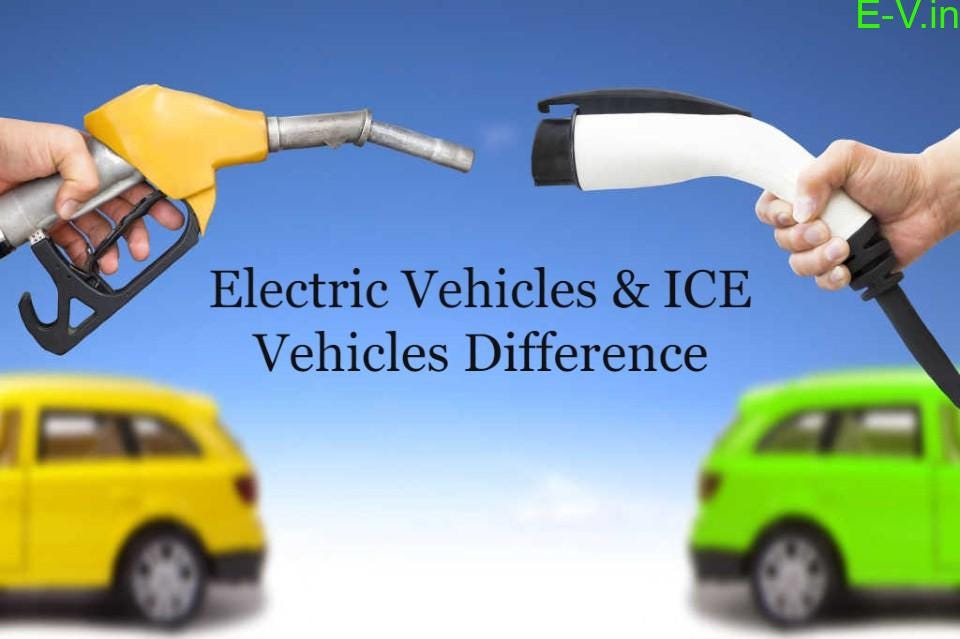
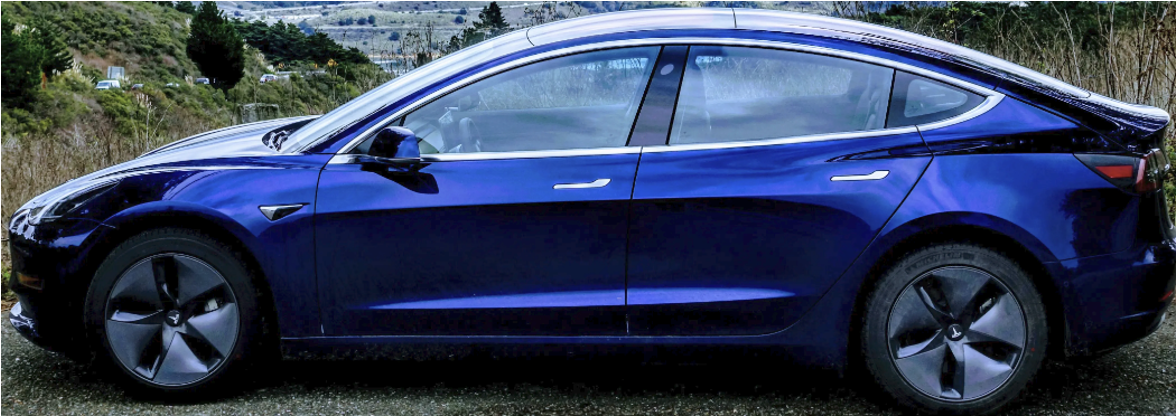
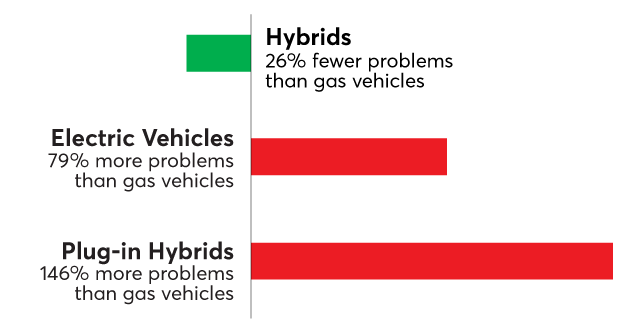

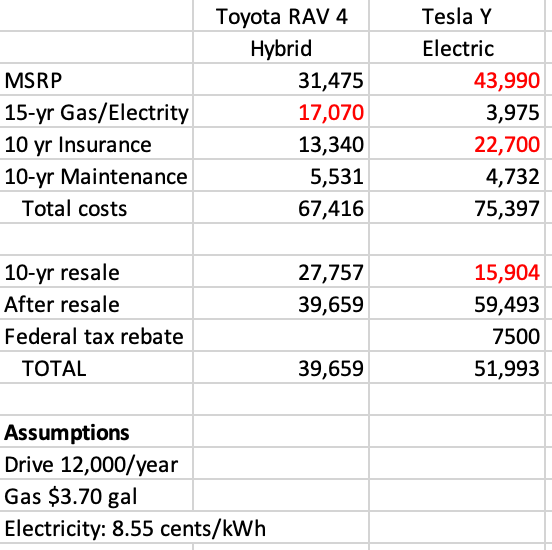
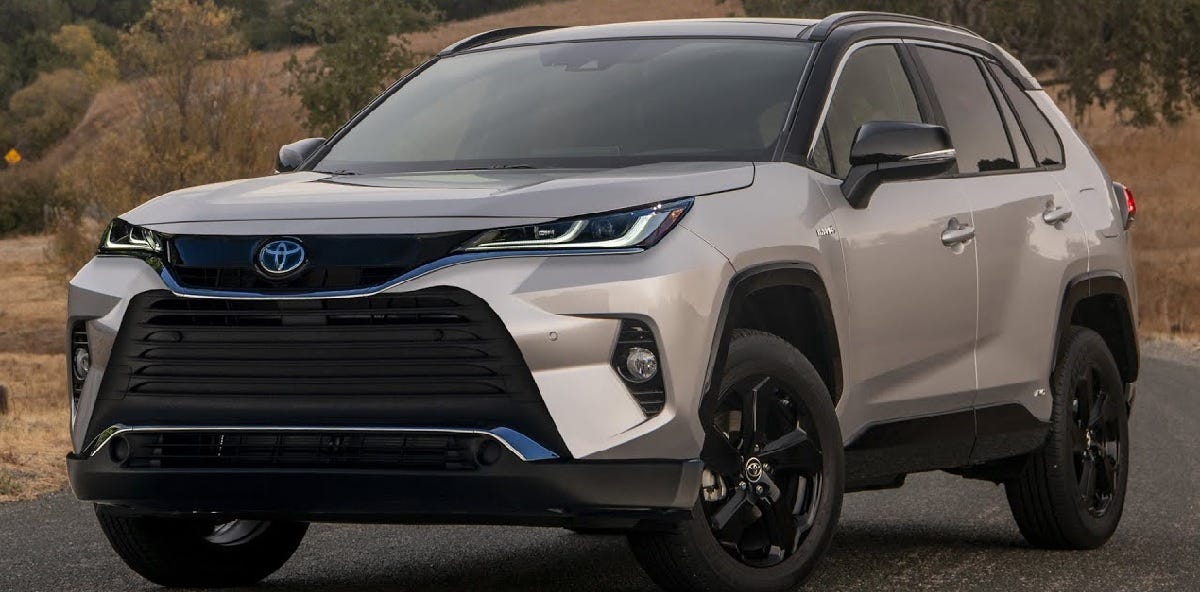

As an owner of several incredibly reliable Toyota hybrid vehicles over the past 24 years, include a RAV4 plug-in hybrid for the past 4 year, I would strongly advocate a plug-in hybrid. The Toyota one is incredibly reliable, as you might expect, and with a 50 mile range, can be used in full electric mode for most journeys. The resale value is also outstanding.. Long range plug-in hybrids are going to dominate electric vehicles for the simple reason that they have zero range anxiety (indeed they have incredible ranges) and can be charged at home with a regular plug. So no special electricity infrastructure is required.
I would not touch any hybrids other than Toyota or Lexus at the moment as few have the same extraordinary reliability.
Good write-up. I'm curious if there's an engineering reason for the plug-in hybrid issue (or the hybrid advantage), or if it's purely a matter of the allocation of the specific manufacturers and models.
I was told some years ago that Toyota was now in a class by itself in terms of reliability because it is the only auto manufacturer that treats reliability as its top priority. This is in contrast to maybe 20 years ago, when Honda, for example, placed a similar priority on reliability.